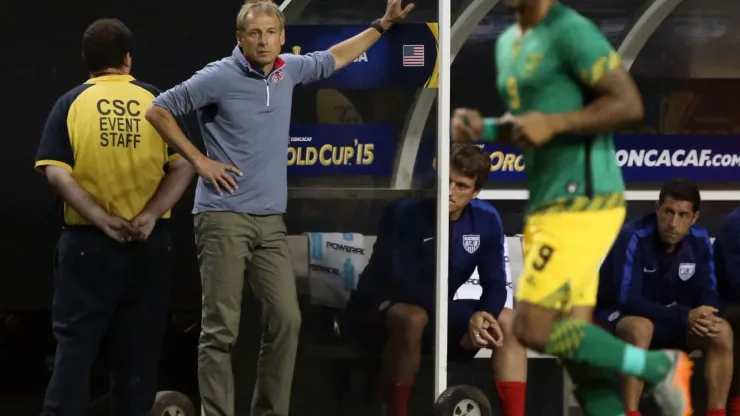As expected, the USA’s 2-1 loss in the CONCACAF Gold Cup semifinals to Jamaica was met by the usual chorus of critiques from some quarters of the American soccer press and reactive US fans. The criticism was quite predictable –“Jürgen Klinsmann must be fired,” “The US is badly underachieving,” “This team was better off under Bob Bradley,” etc.
Jürgen Klinsmann isn’t being fired nor should he be fired.
The US men’s talent pool might be deeper than ever but at the top it is also weaker than any time since the 1998 World Cup.
Compare the current squad to players from the past including Claudio Reyna, John O’Brien, Joe Max Moore, Landon Donovan and Brian McBride. Looking at the current roster, only Michael Bradley would likely have started in the 2002 World Cup quarterfinal against Germany and that would have been in a withdrawn midfield position.
The Jamaica team that defeated the United States last night has a number of accomplished professionals playing in the top two divisions of English football or in Major League Soccer. Jamaican defender Wes Morgan, for example, captains a Premier League club, Leicester City. No American has ever been a permanent “club captain” of an English top-flight team. But to listen to the droning on and boring analysis of some in the American soccer punditocracy, “the USA should have faced little competition from Jamaica,” a team that impressed in the Copa America last month in close-shave defeats to Uruguay and Argentina.
SEE MORE — Klinsmann may not be the right person for USMNT job
The disrespect to CONCACAF opposition is a new facet of the fandom and others who critique the US Men’s National Team. During the era when American-born coaches ran the men’s national team, we were told the region was full of exceptionally talented sides and that Bradley’s changes were often fortunate to prevail. During the 2009 Gold Cup, excuses were made following a 2-2 draw with Haiti and a 5-0 drubbing in the final to Mexico. In fairness, Bradley played that competition with a B+ side, and did a credible job in his four plus years in the job. But the overall message is that Klinsmann should roll over CONCACAF opposition and that the US is supremely talented.
The combination of wanting to pin failures on a German-born manager who has criticized the overall structure of US Soccer as well as MLS, while defending the team’s stars who have come home to MLS instead of toughing it out in Europe has driven much of this “analysis.”
SEE MORE — Don’t blame Jurgen Klinsmann for USA’s shortcomings
Klinsmann does have shortcoming as a manager, no doubt – he falls in love with player potential rather than performance and regularly makes tactical mistakes in-game. But the overall direction he seeks to bring this program is a positive forward direction that must be undertaken. Unfortunately, like Steve Sampson, he is dealing with an era when most of the team’s stars left European clubs, and the high-level training and game action offerSD ed in those leagues for the relatively soft life as an MLS poster-boy/superstar.
It is a healthy sign for our major domestic league that they can offer contracts to top American players that allow them to return home. But the welfare of MLS and US Soccer are not necessarily tied together. Perhaps it is more important for the sustained growth of the sport in this country to have all our top national team stars playing at home. But if this is the case, we should accept and expect national team failures. For the time being, the two are irreconcilable – MLS offers a less tactical, nuanced and sophisticated game than the top European leagues. The training regime in the league is also not at the level of the top leagues on the other side of the Atlantic.
Some of the criticisms of Klinsmann have merit. But he has also been dealt a bad hand that is exacerbated by the desire of some in the press and US fandom to protect our domestic leagues and institutions. Fear of change has long characterized some in American soccer. Sunil Gulati knew when he appointed Klinsmann that the pushback would be beyond anything we had seen before if results went south. Unfortunately, that is what we are witnessing today.
200+ Channels With Sports & News
- Starting price: $33/mo. for fubo Latino Package
- Watch Premier League, Women’s World Cup, Euro 2024 & Gold Cup
The New Home of MLS
- Price: $14.99/mo. for MLS Season Pass
- Watch every MLS game including playoffs & Leagues Cup
Many Sports & ESPN Originals
- Price: $10.99/mo. (or get ESPN+, Hulu & Disney+ for $14.99/mo.)
- Features Bundesliga, LaLiga, Championship, & FA Cup
2,000+ soccer games per year
- Price: $5.99/mo
- Features Champions League, Serie A, Europa League & Brasileirāo
175 Premier League Games & PL TV
- Starting price: $5.99/mo. for Peacock Premium
- Watch 175 exclusive EPL games per season






